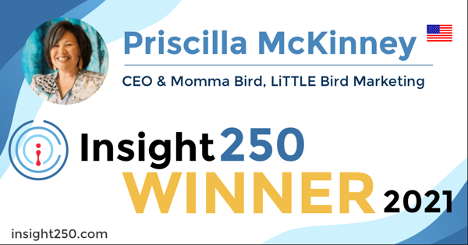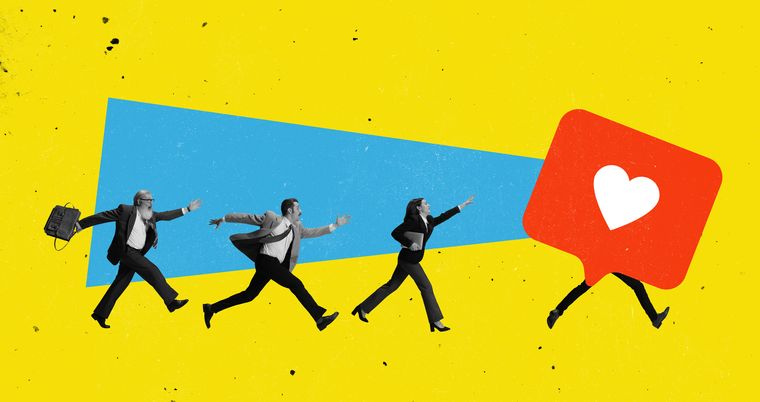The evolving importance of social media
The benefits, challenges, and opportunities social media provides as it continues to evolve in our society.

The Insight250 spotlights and celebrates 250 of the world’s premier leaders and innovators in market research, consumer insights, and data-driven marketing. The inaugural list was revealed in April 2021 and created renewed excitement across the industry whilst strengthening the connectivity of the market research community.
With so many exceptional professionals named to the Insight250 it seems fitting to tap into their expertise and unique perspectives across an array of topics. This weekly series does just that; inquiring about the expert perspectives of many of these individuals in a series of short topical features.
This edition focuses on the evolving importance and challenges of social media. I sat down with Priscilla McKinney, Chief Executive Officer of LiTTLE Bird Marketing to get her insightful perspective on the benefits, challenges, and opportunities social media provides as it continues to evolve in our society.
Priscilla, you have a unique blend of experience in MRX, banking, cultural anthropology, and as an entrepreneur - how does this mix help with the day job?
“I think looking at things from a different perspective is always key to creating new opportunities. This is not only true in my professional life, but also in my personal life I grew up as a third-culture kid - an American living in Spain and later in boarding school in Germany. In Europe, they saw me as American. In America, they saw me as European. This outsider perspective translated well when I got my degree in Cultural Anthropology, started several businesses, and now serve the market research world. It can be a matter of never getting too stuck in one particular way of seeing things or doing things.”
Priscilla McKinney
You've talked in the past about people and organisations being "stuck" - what does that mean and how do we "unstick" things?
“For market researchers, their natural curiosity drives them out of "stuck" moments. Hopefully, they are guiding their clients out of being "stuck" either in revenue plateau or market disruption situations, etc. For marketing, what I find is that start-ups are stuck in paralysis because there is so much advice out there and the options are overwhelming so they don't know what to do.”
Priscilla McKinney
Social media means different things to different people - how do you define it?
“Stories around the campfire were social media. The town crier was social media. The telegraph was social media. As a cultural anthropologist, I know that the human race has always communicated through social media. Currently, our most efficient and scalable social media involves online social platforms. As always, it matters if people know where your fire circle is, whether they bring other people to it, whether they think you are telling a compelling story and whether or not they will go back to their home fires and retell it. Once you understand that for social media you begin to understand that lighting the fire is not enough. If you build it, they will not necessarily come.”
Priscilla McKinney
What are the main differences between traditional marketing and social media marketing?
“Traditional marketing interrupts. The social media market happens in a natural flow of a social platform. To extend the metaphor of the campfire, we know that to transmit your message you need to be engaging. To oversimplify, traditional marketing PAID for the reach whereas social media marketing earns the reach.”
Priscilla McKinney
So for researchers is social media more important than traditional channels?
“The channel you choose should be dependent on the type of message you're trying to convey. If you have a very narrow audience, skywriting might work and be splendid, but it will never reach the serendipitous audience in the next town over. Social media is just a vehicle. You can own a fancy one, or it can be nearing 300,000 miles, but as long as it gets you there then I approve. However, speaking of vehicles, if you consider taking a Lyft, Uber, or yellow or black cab there remember that those forms of transportation are your choice of vehicle. No matter what choice, you don't get in and tell the driver that it's ok to take you wherever they want to go. Social media as a vehicle is the same way. No matter the choice of platform, you need to know your destination and purpose.
“What I can say for researchers specifically about social media is two-fold. First of all, you might find social listening incredibly interesting and helpful for actual research or the development of hypotheses. Secondly, in terms of recruitment for participation in market research, I don't know how you could live without mastering social media. This is true for a fresh audience from within the general population as well as for finding super low incidence, hard-to-reach potential respondents.”
Priscilla McKinney
How should research professionals capitalise on the power of Social?
“Once upon a time professionals thought of socialising for getting their next gig. Now, many see it as essential for sales (HINT: It is.), but few really understand the power it holds to influence an industry. While 'thought leadership' might get overused out there to describe what people do, truly there is so much that can be done in that vein. But my last thought is that collaboration comes through great communication and the scale of social media for communication is unparalleled. Think of not only collaborating with potential strategic partners, but also colleagues (social is the new water cooler), and don't miss golden opportunities to reach across the aisle and collaborate with competitors. Collaboration is the new competition.”
Priscilla McKinney
What are the dangers of social media for our profession? Can you give an example of where you've seen it all go wrong?
“The dangers of social media are the same as the dangers of being social. If you go to a cocktail party and talk only of yourself you will be avoided and most likely not invited back. The same goes for social. Three specific things I see go wrong is endless tagging inside posts (I feel tagging is most effective in comments when it makes sense). Secondly, conversing only within your own feed is the equivalent of hogging the conversation and never letting someone else get a word in edgewise. Lastly, I see a lot of "broadcasting" (posting and posting and posting) and little "narrowcasting" (careful consideration of one's audience to curate content. I have so much more to say here, but I had better stop at three examples.”
Priscilla McKinney
What are the "must do's" that every agency and individual should do to capitalise on this channel?
“Everyone needs to realize that regardless of your personal preferences, nothing is more natural, scalable, and organic than social media platforms. If you need to advance your ideas, career, industry, or wish to serve others with your expertise and experience, you have to become a digitally transformed professional and master social media.”
Priscilla McKinney
How do you see social media continuing to evolve and can we be more innovative in our use of social?
“We see platforms always moving algorithms to make the experience more enjoyable. Honestly, they also change their algorithms to make their companies more profitable. As it continues to evolve, smart professionals will understand the balance between these two things and find opportunities to maximise their influence no matter what changes come (and they won't stop coming).”
Priscilla McKinney
Top tip
Collaboration is the new competition. Think differently about how you approach networking. It's not about sales all the time, but building an important tribe of people who will advocate for you, finding ways to bring people together, explore ways to help others and improve the industry, challenge your thinking, and being visible so someone will introduce you to the next person who could change your life.
Priscilla McKinney
As communications continue to evolve in our world and engagement continues to be critically important, the role of social media is a focal point for many businesses. Pricilla provides invaluable advice on how to effectively use social media, but to focus on the application and etiquette of the messaging rather than primarily on the tools and platforms that deliver the content. Effectively using social media as a communication channel can not only enhance one’s influence but also build trust, loyalty, and even evangelism with consumers. Thanks Priscilla – really insightful and much for all of us to take on board.
 Priscilla uses cultural anthropology, market research, banking, and entrepreneurial experience to help clients. She also serves as CEO of Clear Entertainment & Marketing Group and is the host of Ponderings From the Perch podcast that discusses market research, entrepreneurship, and marketing best practices.
Priscilla uses cultural anthropology, market research, banking, and entrepreneurial experience to help clients. She also serves as CEO of Clear Entertainment & Marketing Group and is the host of Ponderings From the Perch podcast that discusses market research, entrepreneurship, and marketing best practices.
Crispin Beale
Chairman at QuMind, CEO at Insight250, Senior Strategic Advisor at mTab, CEO at IDXCrispin Beale is a marketing, data and customer experience expert. Crispin spent over a decade on the Executive Management Board of Chime Communications as Group CEO of leading brands such as Opinion Leader, Brand Democracy, Facts International and Watermelon. Prior to this Crispin held senior marketing and insight roles at BT, Royal Mail Group and Dixons. Crispin originally qualified as a chartered accountant and moved into management consultancy with Coopers & Lybrand (PwC). Crispin has been a Board Director (and Chairman) of the MRS for nearly 20 years and UK ESOMAR Representative for c15 years. As well as being CEO of Insight250, Crispin is currently Worldwide CEO of Digital Communications Solution Agency, IDX. Crispin is also the Senior Strategic Advisor at mTab and the Chairman of QuMind and spent 4 years as Group President of Behaviorally where he was responsibile for the client & commercial teams globally. Crispin is a passionate advocate for blending human intelligence and technology to deliver innovation and leadership across organisations.


